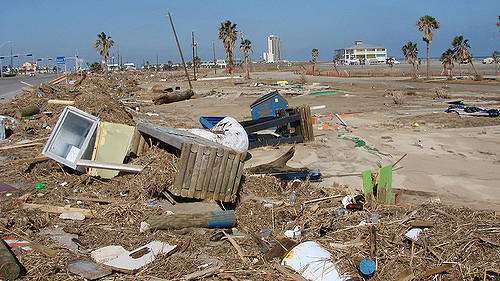- Helene forced a North Carolina restaurant owner to leave his home. He just lost his 'Cabin of Hope' in recent wildfires
- Carolina wildfires grow, evacuation orders still in effect
- Helene forced a North Carolina restaurant owner to leave his home. He just lost his 'Cabin of Hope' in recent wildfires
- Severe weather likely in the Carolinas on Monday
- 3 dead, flash floods overwhelm South Texas, with some areas receiving more than 12 inches of rain
When It Comes To Federal Hurricane Protection Dollars, Oil Companies Get First Dibs

From Texas Standard:
Oil companies have long been blamed for playing a role in climate change. But now, those companies are asking the government to protect their interests from the harsher storms and higher tides connected with global warming.
Companies on the Texas Gulf Coast, which is still recovering from Hurricane Harvey, are pushing for a 60-mile stretch of sea walls and levees that would help protect homes, beaches and, yes, oil infrastructure, from the next big storm.
Will Weissert, who covered this story for The Associated Press, says Texas has asked for $12 billion to pay for the “coastal spine,” or the moving sea wall that would protect a long stretch of the Gulf Coast. Another $4 billion has already gone to three areas along the coast that are key to the oil industry: Port Arthur, Freeport and parts of Orange County.
“All three of those areas are key oil-refinery areas,” Weissert says. “Those three projects are sort of getting priority to get funding in this first tranche of funding.”
Weissert says the companies are taking advantage of the momentum after Hurricane Harvey to invest in protecting the Gulf coastline. The idea for the coastal spine project started in 2008 after Hurricane Ike, but now there’s actually money available to try to get it built.
While there’s consensus that Texas needs to protect people and businesses along the coast, Weissert says energy companies have an unfair advantage. The Army Corps of Engineers oversees how the $4 billion will be used, and prioritizes its projects based on national interest, not necessarily what’s best for the Gulf Coast region, Weissert says.
“They were looking more closely at protecting things that would really make an impact on the national scale, and that’s where the oil refineries come in. … This is such a key part of our nation’s infrastructure,” he says.
Gas prices spiked all over the country when refineries went offline after Hurricane Harvey. Weissert says that’s precisely why the engineers are focusing on protecting those industrial spaces first.
After other hurricanes, the rebuilding effort was a collaborative process between federal, state and local governments, and private industry, he says. But in this case, at least so far, the oil companies have said they’ve already paid taxes that should have gone to infrastructure maintenance, and don’t want to be doubly taxed, especially because they say the original money was misused.
Written by Caroline Covington.